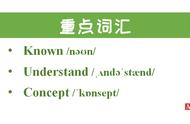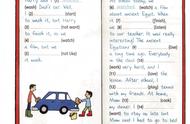(中考知识点持续发布中,敬请期待。需要该资料电子版,点击“关注”,点赞后发私信给我即可。)
八年级下册重点知识
1.What's the matter\the trouble\wrong with sb\sth?某人\某物怎么了?What's the matter\the trouble\wrong with you,Tom?汤姆,你怎么了?
I has a cold我感冒了。
2. should (情态动词,应该),后跟动词原形We should help him.
(一般疑问句)you help him? Yes,we should.\No, we shouldn't.
(否定句) We shouldn't help him.
(划线提问)What should you do?
3. without(没有),后跟名词或doingWe can't finish the work without his help.
(名词,帮助)没有他的帮助,我们不能完成这项工作。
He went to school without having breakfast.
(动词,have)他没有吃早饭就去上学。
4. expect sb to do sth期待某人做某事We expect him to help us.我们期待他帮助我们。
5. agree with sb同意某人(的观点、意见等)Do you agree with him?你同意他的意见吗?
agree to do sth同意做某事He agreed to go shopping with us.他同意和我们一起购物。
6. thanks to 名词\代词\doing:幸亏,由于
Thanks to the book,I can pass the exam.
(book,名词,书)幸亏这本书,我通过了这次考试。
Thanks to getting up early,he got to school on time.
(get,动词)幸亏起得早,他按时去上学。
7.have trouble (in)doing sth做某事有困难He has trouble (in) reading the book.他读这本书有困难。
8.be interested in 名词\代词\doing:对…感兴趣He is interested in English,but he isn't interested in speaking English.(English为名词,speak为动词)他对英语感兴趣,但是对说英语不感兴趣。
9. be used to 名词\代词\doing:习惯于…,适应于…I'm used to getting up early.我习惯早起。
He is used to hot weather.他适应热的天气。
10. because of 名词\代词\doing:因为 because 句子:因为He was late for school bacause he got up late.
他因起晚而上学迟到。(because后为句子)
= He was late for school bacause of getting up late.
(because of后为动词get)
11. be ready to do sth准备做某事,乐意做某事
He is always ready to help other.他总是乐于助人。
12.mean doing sth:意味着…This means losing the basketball game.这意味着比赛失败。
13.keep on doing sth:继续或坚持做某事He kept on reading English after a rest.在休息了一会后,他继续读英语。
14. make a decision to do sth=decide to do sth决心做某事或决定做某事He made a decision to visit Beijing.他决定去访问北京。
= He decided to visit Beijing.
15. give up doing sth:放弃做某事Don't give up your dream.不要放弃你的梦想。
His father gave up smoking.他的爸爸戒烟了。
16. hope to do sth希望做某事 hope (that) 句子:希望…
They hope to visit Beijing one day.他们希望有一天去参观北京。
= They hope (that) they can visit Beijing one day.
17.put off doing sth:推迟做某事He has put off going home.他已经推迟回家。
18.make a plan to do sth= plan to do sth计划做某事 (plan过去式为planned)He made a plan to learn English.他制定了计划学习英语。
19.lonely(形容词,常放在be\feel后)孤独的,寂寞的 alone (副词,常放在实义动词后)独自,单独地He lives alone in the room(副词alone修饰动词live),but he doesn’t feel lonely.
(形容词lonely放在感官动词后作表语).他单独住在这个房间里,但不感到寂寞。
20. see sb do sth:看见某人做某事 see sb doing sth:看见某人正在做某事I saw him read English this morning.今天早晨我看见他读英语了。
I saw him playing basketball.我看见他正在打篮球。
21. be busy with sth忙于某事 be busy doing sth 忙于做某事
She is busy with his homework.
= She is busy doing his homework.她正忙着做作业。
22. stop to do sth停止正在做的事去做另一件事He stopped to read.他停下来去读书。
stop doing sth停止停止正在做的事Please stop talking.请停止说话。(stop过去式stopped)
23. send sb sth=send sth to sb送给\寄给某人某物 (send的过去式为sent)He sent me a pen.= He sent a pen to me.他送给我一直钢笔。
24. Could you please do sth? :你可以做某事吗?请求别人帮助时常用此句型。肯定回答,常用Sure\Certainly\Of course.否定回答,常用Sorry, …。一般不用no开头。
Could you please help me with the housework?请你帮我做家务活好吗?
Sure\Certainly\Of course\Sorry,Im busy now.
25. neither+be∕助动词(do /does/ did/will/ would/ have/has/had)/情态动词+主语 :某人也不…She isn’t a student. Neither am I. 她是一个学生,我也不是。
She didn’t to school just now. Neither did I.
她刚才没去学校,我也没去。
She hasn’t finished the work. Neither have I.
她还没有经完成工作,我也没完成。
She won’t go to school. Neither will he. 她将不去学校,他也不是。
26.find sb\sth 形容词:发现某人\某物怎么样
I found our classroom dirty.我发现我们的教室很脏。
27.pass sb sth=pass sth to sb递给某人某物Please pass me a book.请递给我一本书。
= Please pass a book to me.
28. buy与sell的用法:buy sb sth=buy sth to sb给某人买某物 (buy过去式bought)He bought his father a shirt.
= He bought a shirt to his father.他给他的爸爸买个一件衬衣。
buy sth from 地点:从某地买来某物sell sth to sb:把某物卖给某人He bought a book from the book store.他从书店买了本书。
= The book store sold a book to him.书店卖了本书给他。
29. make sb do sth:让某人做某事He often makes me help him.他经常让我帮助他。
30.in order to do sth:为了…In order to catch the bus,he gets up early.为了赶上公交车,他起地非常早。
31.There is no need (for sb) to do sth:(对某人来说)没有必要做某事
There is no need for the boy to get up early.没有必要让这个男孩其地这么早。
32.provide sb with sth=provide sth for sb提供给某人某物Our school provides us with hot water.
= Our school provides hot water for us.我们学校给我们提供热水。
对比:offer sb. sth.= offer sth to sb 给某人提供某物Our school offers us hot water.
=Our school offers hot water to us.学校给我们提供热水。
33.mind doing sth:介意做某事Would you mind opening the door?你介意关上门吗?
Not at all.一点也不。
34.do one’s part in 名词\doing sth:参与…She did her part in the party. 她参加了那个聚会。
He did his part in planting trees last week.上周他参加了植树活动。
35.The 比较级( 句子),The 比较级( 句子):越…,越…。The more you eat,the fatter you will be.你吃地越多,你将越胖。
比较级 句子 比较级 句子
The more,the better.越多越好。
36. why don’t you do sth =why not do sth?为什么不… ?
Why don’t you go shopping this afternoon ?今天下午为什么不去上街买东西呢?
=why not go shopping this afternoon?
37.allow sb to do sth:允许某人做某事My mother allows me to watch TV on weekends.我的妈妈允许我周末看电视。
38. find sb doing sth:发现某人正在做某事I found him singing.我发现他正在唱歌。
39. so that作“为了”时,引导目的状语从句,从句常出现情态动词。如:She got up early so that she could catch the bus..
为了能赶上车,她起得很早。(目的状语从句)
40.although (=though)不能与but 连用,但可以与yet ,still 连用。Although it is dark ,they are still working .虽然天黑了,但他们仍在工作。
Though he is old ,he is quite strong .他虽然年龄大了,但身体很健壮。
41. refuse to do sth:拒绝做某事
He refused to help the girl.他拒绝帮助这个女孩。
42.instead代替,而不是(常放在句首或句末,不译出)It’s too hot to walk,we’ll go swimming instead.
天太热不能去散步,我们要去游泳。
instead of n/代词/doing:代替…;而不是…He will go to Japan instead of France.他要去日本而不是法国。
I studied at home instead of going to a movie.我在家学习而不是
43. I think 句子,意为“我认为…”,think引导的句子如果表示否定意义,否定转移到动词think前,因此该句子的否定句为“I don't think 句子”。就是在 I think后面的从句中,如果有否定含义,往往需要把否定词从从句移到主句,称为否定转移。I think he is only 12 years old.→(否定句)
I don't think he is only 12 years old.
49. until 的用法:<1>若动词为延续性动词则用肯定句式 。He studied until 21:00pm.他一直学习到晚上九点。
<2>若动词为非延续性动词,则用not….until…(直到…才…)He didn’t go to bed until his father came back .
他一直到他爸爸回来才上床睡觉。
50. be afraid of 名词\代词\doing:害怕…,不敢…He’s afraid of the dog.他害怕狗。
The boy is afraid of crossing the street.这个男孩不敢穿越街道。
51. learn to do sth:学会做某事
She learned to cook at the age of five.在五岁的时候,她学会了做饭。
52. It is/was time to do sth意为“该干……了;是干……的时候了”It is time to go to bed.是该睡觉的时候了。
注意:如果要表示“该某人做某事”时,应在to的前面加上for sb,即 It is/was time for sb to do sthIt is time for us to have dinner.我们该吃晚饭了。
53. begin doing sth = begin to do sth 开始做某事 (二者可以互换)The children began to sing\singning.孩子们开始唱歌了。
54. make sb./sth. 形容词:使…怎么样It made me happy. 它使我高兴。
补充:make sb do sth :让某人做某事It made me laugh. 它让我发笑。
55. remember to do sth 记得去做某事(还未做) remember doing sth记得做过某事(已做完)Remember to close the door when you leave.记得当你离开的时候关上门(门未关)
He remembered closing the door.他记得他已关上门。(门已关上)
56. have trouble ( in) doing sth 做某事有困难= have trouble with sth
He has trouble ( in) learning Japanese.他学习日语有困难。
= He has trouble with Japanese.
57. work on doing sth :从事…He worked on repairing cars.他一直从事修理轿车。
58. continue to do sth:继续做某事After a rest,they continued to learn English.在休息完后,他们继续学习英语。
59.a (good) way to do sth:做某事的(好)方法He found a good way to learn English.他发现了一个学习英语的好方法。
60.keep doing sth:一直做某事They kept reading.他们一直在读书。
61. one of the 形容词最高级 可数名词复数:最…之一
Shanghai is one of the biggest cities in China.
在中国,上海是最大的城市之一。
62. can’t wait to do sth:迫不及待地做某事He can’t wait to open the box.他迫不及待地打开了盒子。
63. have been to 地点:去过某地(已经回来了) have gone to 地点:去了某地(还未回来)He has been to the Great Wall twice.他去过长城两次。
Where is Tom? He has gone to the libeary.汤姆去哪里了?他去图书馆了。
64. encourage sb to do sth:鼓励某人做某事My parents encourage me to study hard.我的父母亲鼓励我努力学习。
65. hundred,thousand,million 用法(以下hundred为列) hundreds of 名词:成百上千的(表示模糊数字) 数字+hundred 名词:几百(表示具体数字)There are hundreds of books in the library.在图书馆有成千上万本书。
There are six hundred students in our school.在我们学校有600个学生。
66. have problem/difficulty (in)doing sth做某事有困难He has problem reading the English book.他读这本英语书有困难。
67. ★★ 非延续性动词与时间段的关系:实义动词按照持续时间的长短可以分为延续性动词和非延续性动词,延续性动词可以和一段时间(for 一段时间)连用,表示这个动作持续时间的长短;但是非延续性动词不能与一段时间连用。
(一)非延续性动词在肯定句、疑问句中不能与时间段连用,这些动词是:become, begin, buy, borrow, arrive, come, die, fall, finish, get to know, go, join, leave, marry 等
(二)相应的延续性动词代替非延续性动词:buy → have, borrow → keep,become →be,Leave 地点→be away(from 地点),join→be in …\be a member of …,die→be dead, finish→ be over,start\begin →be on,come(go, arrive, get) →be here/there/in…, fall asleep (ill) →be asleep(ill), get to know→know, , marry→be married等将下面的句子变为同义句。
例:I borrowed the book 2 weeks ago.
I have kept the book for 2 weeks.这本书我借了2周了。
这辆自行车我买了一年了。
将下列句子变为同义句。I bought the bike a year ago.
He joined the club five years ago. 他加入俱乐部五年了。.
=
The film began five minutes ago.电影开始五分钟了。
(三)但在否定句中,非延续性动词可以与时间段连用。
如:I haven’t bought the bike for a year. 我买这辆自行车还不到一年。
She hasn’t come here for an hour. 她来这儿还没有一个小时。
(四) 翻 译 练 习:1.我买了这块手表五年了。
2他死了五年了。
3.我离开家乡已十年了。
68. give sb sth =give sth to sb 给某人某物(give的过去式为gave)Please give the book to me =please give me the book .请把这本书给我。
,














